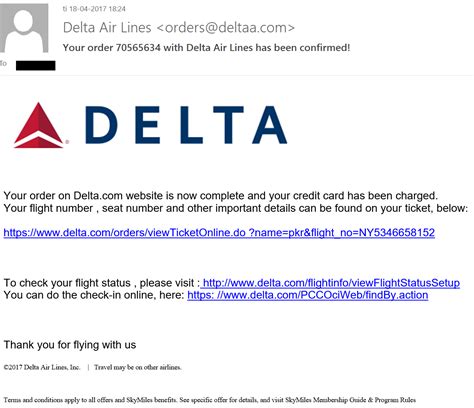Are you aware of the growing threat of fake flight confirmation email scams? These scams are becoming increasingly sophisticated, and it's essential to be informed to avoid falling victim to them.
If you've ever booked a flight online, you're likely familiar with the confirmation emails that airlines send to passengers. However, scammers have been using these emails as a way to trick people into divulging sensitive information or downloading malware. In this article, we'll delve into the world of fake flight confirmation email scams, exploring how they work, the warning signs to watch out for, and most importantly, how to protect yourself from these threats.
How Fake Flight Confirmation Email Scams Work
Scammers use various tactics to create fake flight confirmation emails that appear legitimate. Here are some common methods:
- Phishing emails: Scammers send emails that mimic the airline's branding, including logos, colors, and fonts. These emails often contain links or attachments that, when clicked or downloaded, can install malware or redirect you to a phishing website.
- Spoofing emails: Scammers create emails that appear to come from the airline's email address, making it difficult to distinguish between legitimate and fake emails.
The goal of these scams is to trick you into revealing sensitive information, such as:
- Login credentials: Scammers may ask you to log in to a fake website or provide your login credentials to "verify" your flight details.
- Financial information: Scammers may ask you to provide your credit card details or other financial information to "pay" for a non-existent service.
- Personal data: Scammers may ask you to provide your personal data, such as your address, phone number, or passport details.

Warning Signs to Watch Out For
To avoid falling victim to fake flight confirmation email scams, be aware of the following warning signs:
- Urgency: Scammers often create a sense of urgency, claiming that your flight details need to be verified immediately or that you'll miss your flight if you don't take action.
- Spelling and grammar mistakes: Legitimate airlines typically have professional email templates. If you notice spelling or grammar mistakes, it may be a scam.
- Suspicious links or attachments: Be cautious of emails that contain links or attachments that you're not expecting. These could be malware or phishing attempts.
- Request for sensitive information: Airlines will never ask you to provide sensitive information via email. If an email asks for your login credentials, financial information, or personal data, it's likely a scam.
Protecting Yourself from Fake Flight Confirmation Email Scams
To avoid falling victim to these scams, follow these best practices:
- Verify the email address: Check the email address to ensure it's legitimate. Scammers often use email addresses that are similar to the airline's but with slight variations.
- Check for spelling and grammar mistakes: Legitimate airlines have professional email templates. If you notice mistakes, it may be a scam.
- Be cautious of links and attachments: Avoid clicking on links or downloading attachments from unknown senders.
- Use strong antivirus software: Install reputable antivirus software to protect your device from malware.
- Keep your operating system and software up-to-date: Ensure your operating system and software are updated with the latest security patches.

What to Do If You've Fallen Victim to a Fake Flight Confirmation Email Scam
If you've provided sensitive information or clicked on a suspicious link, take immediate action:
- Change your passwords: Update your login credentials and passwords for all sensitive accounts.
- Monitor your accounts: Keep a close eye on your bank and credit card statements for any suspicious activity.
- Run a virus scan: Use antivirus software to scan your device for malware.
- Report the incident: Inform the airline and your bank or credit card provider about the scam.






By being aware of the warning signs and taking steps to protect yourself, you can avoid falling victim to fake flight confirmation email scams. Always prioritize caution when receiving emails from unknown senders, and never provide sensitive information unless you're certain it's a legitimate request.
Stay vigilant and stay safe!
What is a fake flight confirmation email scam?
+A fake flight confirmation email scam is a type of phishing scam where scammers send emails that appear to be from an airline, but are actually attempts to trick victims into providing sensitive information or downloading malware.
How can I protect myself from fake flight confirmation email scams?
+To protect yourself from fake flight confirmation email scams, verify the email address, check for spelling and grammar mistakes, be cautious of links and attachments, use strong antivirus software, and keep your operating system and software up-to-date.
What should I do if I've fallen victim to a fake flight confirmation email scam?
+If you've fallen victim to a fake flight confirmation email scam, change your passwords, monitor your accounts, run a virus scan, and report the incident to the airline and your bank or credit card provider.
